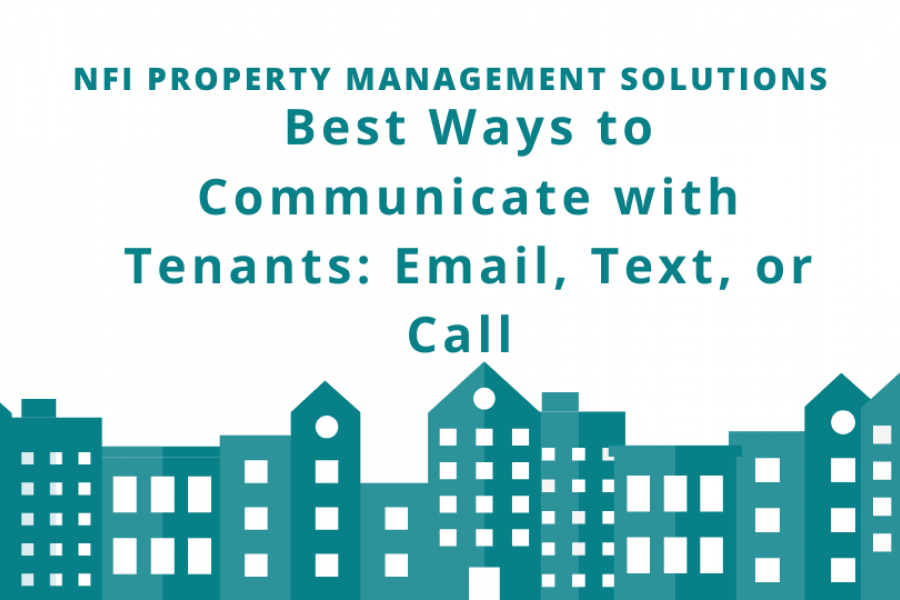
Key Takeaways
-
Choosing the Right Communication Method: Select between phone calls, emails, and text messages based on the urgency and nature of the information to be conveyed.
-
Best Practices for Phone Calls: When calling tenants, be clear and direct, respect their time by calling during appropriate hours, use a friendly tone, and leave concise voicemails when necessary.
-
Advantages of Email Communication: Emails are ideal for sending detailed information or documents that tenants may need to reference later, such as lease agreements or maintenance schedules.
-
Effective Text Messaging: Text messages are suitable for quick, non-urgent communications or reminders, offering immediacy without being intrusive.
-
Maintaining Professionalism: Regardless of the communication method, always maintain a professional and courteous tone to foster positive landlord-tenant relationships.
In today’s digital age, landlords have various communication tools to connect with tenants. However, selecting the right method for each situation is crucial for fostering good relationships and ensuring clear communication.
Understanding when to call, text, or email tenants is key to effective property management.
In today’s guide, we’ll explore the best ways to communicate with tenants—whether through email, text, or phone calls.
Get a Free Rental Analysis
Why Do You Need to Call Your Renters?
Phone calls remain an effective way to communicate with tenants in urgent situations or when a personal touch is needed. While texting and emailing are convenient, some scenarios are best handled with a call.
-
Emergencies: For urgent matters like water leaks or power outages, a call ensures tenants receive the message quickly and take necessary actions.
-
Courtesy reminders: Calls can be more effective than texts or emails for reminding tenants about rent payments or maintenance schedules, allowing for real-time clarification.
-
Information requests: A phone call provides clearer, immediate communication for issues requiring further explanation, especially when a personal touch is important.
What Are the Best Practices for Calling Tenants?
Calling tenants is a great communication method, but it requires professionalism and attention to detail to ensure it’s effective.
Here are some tips for mastering phone etiquette when calling your renters:
1. Be Clear and Direct
When calling, state the purpose of your call right away. Be concise and to the point so you don’t waste the tenant’s time. It’s essential to avoid irrelevant topics and keep the conversation focused on business matters.

2. Respect Their Time
Understand that tenants may have busy schedules. Always try to call during reasonable hours and avoid calling too early or late in the day. If the tenant is unavailable, leave a voicemail with enough information so they can respond accordingly.
3. Use a Friendly Tone
While phone calls are professional, it’s important to maintain a friendly and approachable tone. A warm greeting and polite conversation can go a long way in building a good rapport with your tenants.
4. Voicemail Etiquette
If you leave a voicemail, be clear and concise about the reason for your call. Include your contact information and mention if a callback is needed, especially if a time-sensitive issue is at hand. This ensures the tenant knows the urgency of the matter.
5. Legality of Phone Calls
In some jurisdictions, verbal agreements made over the phone may be legally binding, so it’s essential to be cautious about making any agreements or promises over the phone unless you’re certain of the legal framework in your area.
Always document important communications in writing when possible.
Why Emailing Your Tenants Is Important
Email is ideal for sending detailed information or documents that tenants might need to reference later along with:
- Sending documents: Use email to share important files like photos, contracts, or maintenance updates.
- Overdue rent reminders: Email is efficient for sending reminders or notices about rent payments, especially to multiple tenants.
- Property updates: Email works well for communicating changes in policies or upcoming maintenance.
- Record-keeping: Emails are time stamped and stored, offering a reliable reference in case of disputes.
.jpg)
What Are the Best Practices for Emailing Tenants?
While email is an effective tool for communication, it’s important to use it correctly to maintain professionalism and ensure clarity.
1. Craft Clear, Professional Emails
Before hitting send, always review your email to ensure it’s professional, clear, and concise. Avoid jargon or overly casual language that might be misinterpreted. Make sure to state the purpose of your email in the subject line for clarity.
2. Provide Complete Information
Include all the necessary details in your email. For example, if you’re sending an update about a maintenance issue, make sure to provide the date, time, and any other relevant details so the tenant is fully informed.
3. Use a Business Email Address
To maintain professionalism, always send emails from an official, easily recognizable business email address. This helps tenants identify your message and ensures you come across as a responsible property owner.
4. Send Emails During Business Hours
To avoid disturbing tenants, send emails during standard business hours. Although emails can be read at any time, it’s courteous to avoid sending them late at night or on weekends unless absolutely necessary.
5. Legality of Email Communications
Emails are generally treated as legal documentation in many jurisdictions. However, it’s important to familiarize yourself with the specific legal requirements in your area, as some jurisdictions may have different standards for what constitutes a legally binding notice.

Why Texting Tenants Is Essential
1. Request Permission
It’s important to request permission from tenants before texting them. Include a clause in the lease agreement stating that text messages are an acceptable method of communication for property-related matters.
2. Clarify Text Message Expectations
Clearly outline the types of messages tenants can expect. This may include reminders about rent, scheduled maintenance, or emergency alerts. Texts should be brief, clear, and relevant to property management.
3. Legal Aspects of Text Messages
Some jurisdictions may consider text messages as valid electronic communication. However, to ensure clarity, keep a record of all important written communications in case of disputes.
Bottom Line
The best communication method depends on the situation and tenant preferences. Phone calls are ideal for urgent or complex issues, emails for formal or detailed information, and texts for quick, time-sensitive reminders.
As a landlord, you can maintain good rapport, improve efficiency, and resolve issues more effectively by leveraging the strengths of each communication method. Staying flexible and regularly asking for feedback on communication preferences ensures that your approach remains effective over time.
Are you looking for a trusted property manager to handle your rental space? If yes, don’t hesitate to contact NFI Property Management Solutions today!